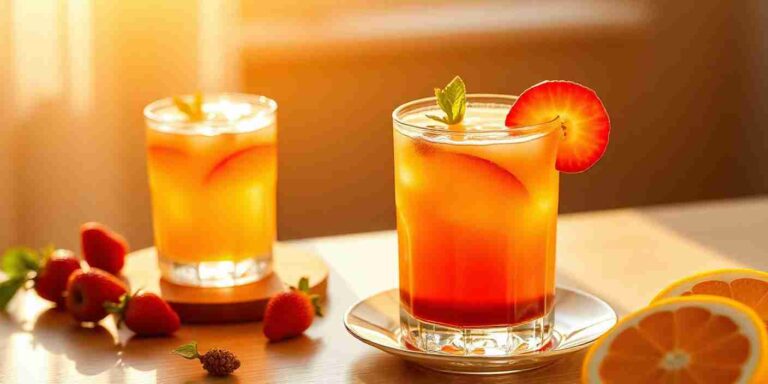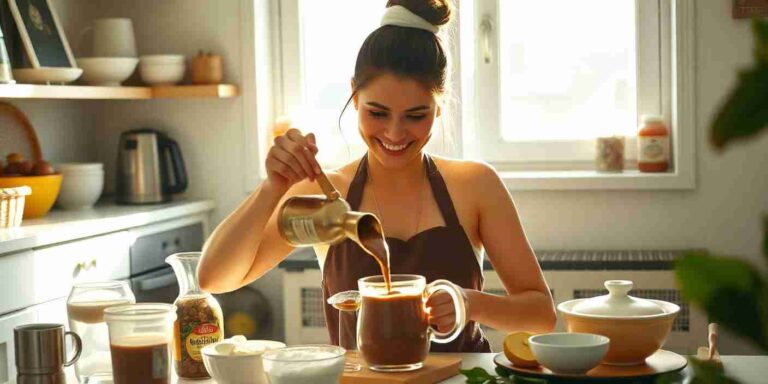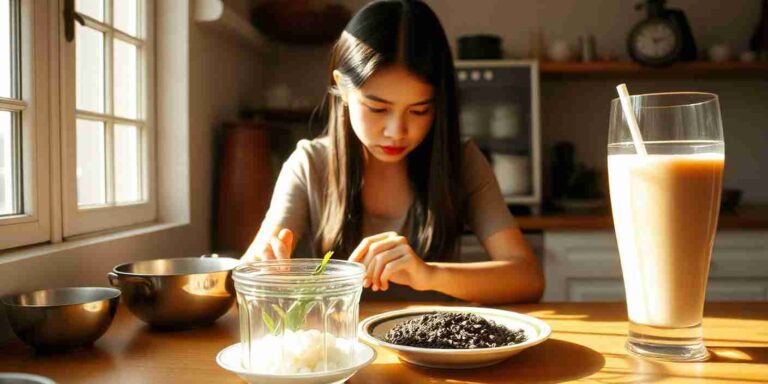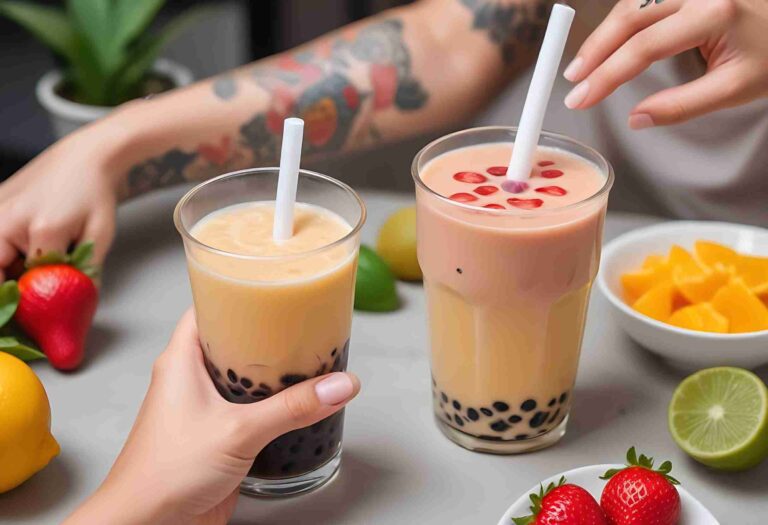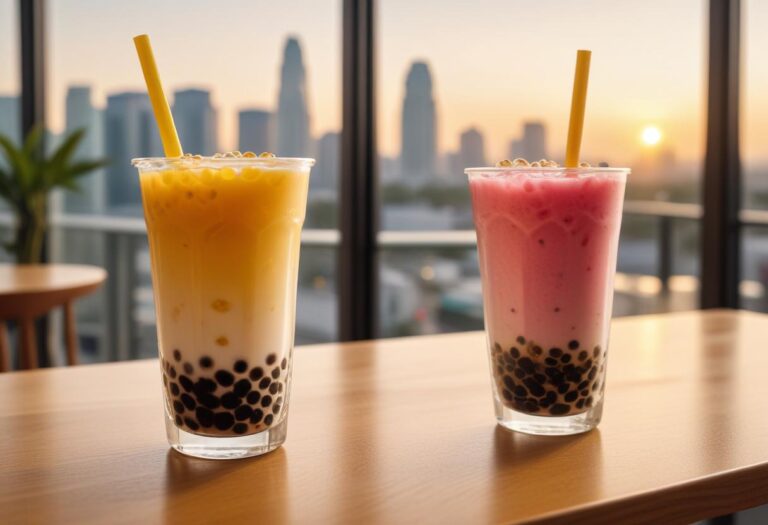Is Boba Tea Gluten Free? Explore Safe Options and Flavorful Variations!
Is Boba Tea Gluten Free? Yes, boba tea is generally gluten-free. This popular drink, known for its chewy tapioca pearls, has gained a massive following thanks to its unique flavors and textures.
But if you’re navigating dietary restrictions or allergies, you might be wondering about its gluten content.
While the primary ingredients of boba tea—tapioca starch and tea—are naturally gluten-free, it’s essential to check for any additional components.
Some flavorings or toppings may contain gluten. By understanding what goes into your cup, you can enjoy your favorite boba tea without worry.
Key Takeaways
- Boba Tea is Generally Gluten-Free: The primary ingredients—tapioca pearls, tea, and milk—are naturally gluten-free, making boba tea a safe choice for those with gluten sensitivities.
- Understand Ingredient Composition: While the main components are gluten-free, additional flavorings or toppings may contain gluten. Always check these ingredients before consumption.
- Potential Cross-Contamination Risks: Be cautious of cross-contamination in preparation areas where both gluten-containing and gluten-free items are handled together.
- Popular Variations Available: Boba tea comes in traditional forms as well as modern variations with unique flavors and toppings; many of these remain gluten-free if made with safe ingredients.
- Safe Choices to Consider: Stick to black or green teas, dairy or non-dairy milk options, and fruit-based flavorings to ensure your boba tea remains free from gluten.
- Always Confirm Preparation Methods: When ordering boba tea, inquire about how drinks are prepared to avoid unintentional exposure to gluten.
Understanding Boba Tea
Boba tea, also known as bubble tea, is a popular drink that you can find in many places. It combines tea, milk, and chewy tapioca pearls.
Originating from Taiwan in the 1980s, this beverage has gained global popularity for its unique taste and texture.
What Is Boba Tea?
Boba tea is a cold beverage that mainly consists of a tea base, which can be black or green. Many people choose to add milk or fruit flavors to enhance the overall taste.
The most distinctive feature of boba tea is the chewy tapioca pearls inside it, commonly referred to as “boba.” These pearls are made from tapioca starch, making them gluten-free.
- Tea: This forms the base of your drink and can vary between black and green varieties.
- Milk: Added for creaminess, milk can be dairy-based or non-dairy.
- Tapioca Pearls: These chewy balls are made from tapioca starch; they don’t contain gluten.
- Flavorings: Some drinks may include syrups or powders for added flavor but check these ingredients for any gluten content.
Being aware of these ingredients helps you enjoy boba tea without worrying about gluten if you’re sensitive or allergic.
Gluten and Its Sources
Gluten is a protein found in specific grains. Understanding gluten helps you make informed choices about your diet, especially regarding foods like boba tea.
What Is Gluten?
Gluten consists of proteins that are present in wheat and related grains. It gives dough its elasticity and helps baked goods rise.
Many people can consume gluten without issues, but some may experience reactions due to conditions like celiac disease or gluten sensitivity.
Foods That Contain Gluten
Common foods containing gluten include:
- Pastas: Such as ravioli, dumplings, and couscous.
- Noodles: Including ramen, udon, and soba.
- Breads and pastries: Examples are croissants, pita bread, and bagels.
- Crackers: Like pretzels and graham crackers.
- Baked goods: This includes cakes, cookies, and pie crusts.
- Cereal and granola
- Breakfast foods: Such as pancakes, waffles, and French toast.
- Breading mixes
- Sauces: Some sauces might contain flour or malt from barley.
Knowing these sources helps you avoid unintentional gluten exposure while enjoying various foods. Being aware of what contains gluten ensures you can indulge in boba tea safely when made with the right ingredients.
Is Boba Tea Gluten Free?
Yes, boba tea is generally gluten-free. The main ingredients in this popular drink include black or green tea, milk, sugar, fruit flavorings, and tapioca pearls.
All these ingredients are naturally gluten-free. Specifically, tapioca pearls, made from tapioca starch derived from the cassava root, do not contain gluten.
Gluten-Free Ingredients in Boba Tea
- Tea: Black, green, or oolong tea are all gluten-free options.
- Milk: You can choose dairy or non-dairy milk options to make your boba tea dairy-free as well.
- Sugar: Regular sugar is completely gluten-free.
- Fruit Flavorings: Most fruit-based flavorings used in boba tea are also gluten-free.
- Tapioca Pearls: Made from tapioca starch alone, these pearls remain a safe choice for those avoiding gluten.
These ingredients provide a delicious and safe experience for individuals with gluten sensitivities.
Potential Cross-Contamination Risks
Be mindful of potential cross-contamination risks when ordering your boba tea. If the same tools or surfaces handle both gluten-containing and gluten-free toppings, there’s a chance of contamination.
Always ask about preparation methods to ensure your drink remains free from any unwanted traces of gluten.
By staying informed about ingredient choices and cross-contamination risks, you can enjoy boba tea confidently without worrying about its suitability for your diet.
Popular Boba Tea Variations
Boba tea features many delicious variations that cater to different tastes. Understanding these options helps you choose the best drink for your preferences.
Traditional vs. Modern Boba Tea
Traditional boba tea originated in Taiwan during the 1980s. It mainly includes black or green tea combined with tapioca pearls.
This classic version emphasizes the original flavors and textures of its ingredients, providing a simple yet satisfying drink.
Modern boba tea has evolved to include new and exciting flavors. You’ll find various combinations such as fruity blends, flavored syrups, and creative toppings like jelly or pudding.
These innovative drinks often appeal to younger consumers looking for unique experiences.
Gluten-Free Options to Consider
When selecting gluten-free boba tea, focus on the base ingredients known for their safety:
- Tea Types: Both black and green teas are naturally gluten-free.
- Milk Choices: Regular dairy milk, almond milk, coconut milk, and oat milk typically do not contain gluten.
- Tapioca Pearls: Most tapioca pearls are made from cassava starch and are gluten-free.
For added flavor without gluten risks, consider fruit-flavored options like mango or taro. Always check ingredient labels or ask staff about any potential cross-contamination when ordering your drink.
Conclusion
Boba tea can be a delightful gluten-free option if you choose the right ingredients. By focusing on traditional elements like tapioca pearls and carefully selecting your flavors and toppings, you can enjoy this popular drink worry-free.
Always remember to ask about cross-contamination practices at your favorite boba shop to ensure your drink remains safe.
With so many delicious variations available, you’re sure to find a gluten-free boba tea that satisfies your cravings while keeping your dietary needs in mind. Enjoy every sip without concern!
Frequently Asked Questions
What is boba tea?
Boba tea, also known as bubble tea, is a popular drink originating from Taiwan. It typically consists of brewed tea mixed with milk and sugar, along with chewy tapioca pearls made from tapioca starch.
Is boba tea gluten-free?
Yes, boba tea can be gluten-free. Its main ingredients—tea, milk, sugar, and tapioca pearls—are naturally gluten-free. However, it’s essential to check for cross-contamination at the store or shop.
What are the traditional and modern variations of boba tea?
Traditional boba tea features black or green tea with tapioca pearls. Modern variations include a wide range of flavors and toppings like jelly, pudding, fruit purees, and flavored teas.
How can I ensure my boba tea is gluten-free?
To ensure your boba tea is gluten-free, choose plain teas without added flavorings that may contain gluten. Opt for cassava starch-based tapioca pearls and confirm no cross-contamination occurs during preparation.
What are some popular flavors of boba tea?
Popular flavors of boba tea include classic black milk tea, green milk tea, mango, taro, matcha, and fruit-flavored options like strawberry or passionfruit. These provide delicious alternatives without gluten risks.

